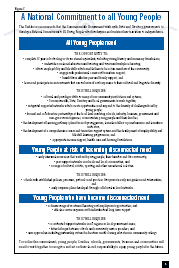|
|
– from the Australian 2001
Prime Minister’s Youth Pathways
Action Plan Taskforce
A National Commitment to all Young People
The Taskforce recommends that the Commonwealth Government work with State and Territory governments to develop a National Commitment to All Young People which underpins and sustains their transition to independence.
All Young People need
THE OPPORTUNITY TO:
complete 12 years of schooling or its vocational equivalent, including strong literacy and numeracy foundations;
undertake vocational education and training and structured workplace learning;
obtain employability and life skills which enable them to be active members of the community;
engage with professional career and transition support;
benefit from effective peer and family support; and
learn and participate in environments that are inclusive of and responsive to their cultural and linguistic diversity.
THIS WILL REQUIRE:
cultural and paradigm shifts in many of our community institutions and systems;
Commonwealth, State, Territory and local governments to work together;
integrated supported networks which create opportunities and respond to the diversity of challenges faced by young people;
focused and collaborative partnerships at the local level involving schools, industry, business, government and non-government agencies, communities, young people and their families;
the development of learning pathways plans for each young person, transition follow-up mechanisms and transition indicators;
the development of a comprehensive career and transition support system and the development of employability and life skill learning programmes; and
appropriate income support, health care and housing foundations.
Young People at risk of becoming disconnected need
early intervention services that work with young people, their families and the community;
peer support networks in schools and local communities; and
a range of cultural, artistic, sporting and other recreational activities.
THIS WILL REQUIRE:
schools with established policies, processes, protocols and practices that promote early recognition and intervention; and
early response plans developed through collaborative local networks.
Young People who have become disconnected need
a diverse range of vocational learning and employment opportunities; and
effective service responses with individualised long term support.
THIS WILL REQUIRE:
co-ordinated support networks in all regions or local government areas;
better linkages between schools and community service providers; and
new approaches including partnership outreach education models basing education in community settings.
To realise this commitment, young people, families, schools, governments, business and communities will need to work together to recognise and act on their shared responsibility to equip young people for the future.
|


– from the Australian 2001
Prime Minister’s Youth Pathways
Action Plan Taskforce


Download this page
as a PDF file
(1 page, 24 kb)
 back to
back to

An Economy
of Connection
— some thoughts after
a Knowledge
Wave
(2003)
by vivian Hutchinson
|


![]()
 back to
back to ![]()